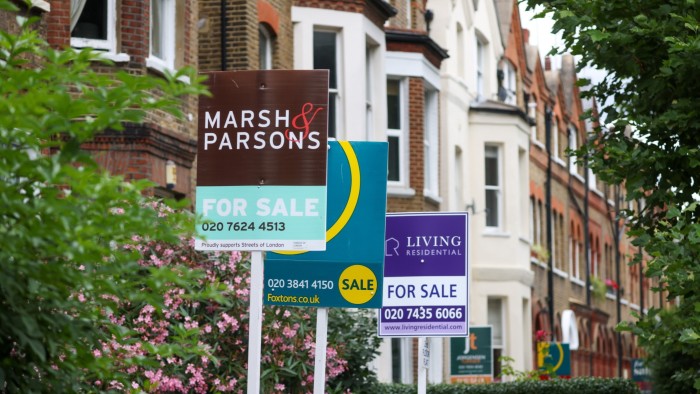Stay informed with free updates
Simply sign up to the UK house prices myFT Digest — delivered directly to your inbox.
UK house prices fell back slightly in December, undershooting economists’ expectations and marking the first contraction since March, according to the lender Halifax.
The average property price decreased 0.2 per cent between November and December to £297,166, new data showed on Tuesday. The contraction follows five months of expansion, including a 4.7 per cent rise during November. Prices were still 3.3 per cent higher than in December 2023.
The figures disappointed economists’ expectations of monthly growth of 0.4 per cent and an annual rise of 4.2 per cent.
The numbers are at odds with separate data by the lender Nationwide, which reported a 0.7 per cent month-on-month increase in December, and indicate the fastest annual pace since October 2022.
Halifax has a larger sample than Nationwide, with about 15,000 transactions compared with 12,000, and a focus on northern regions that can generate short-term differences. However, both Nationwide and Halifax show house prices surging during the pandemic, contracting as mortgage rates rose over the past two years and recovering in 2024.
Separate data by the Bank of England showed last week that mortgage approvals fell to the lowest level since August in November.
The Halifax data suggests that “recent rises in mortgage rates may have started to weigh on the housing market at the end of last year a bit more than previously thought,” said Ashley Webb, economist at the consultancy Capital Economics.
Mortgage rates ticked up in November, as markets forecast that the BoE will lower borrowing costs more slowly than previously expected. However, mortgage costs remain well below their peak reached in summer 2023.
Webb expects mortgage rates to fall to 4 per cent — further than most expect. This would push house price growth to a healthy 3.5 per cent in 2025, higher than the consensus forecast of 2.5-3 per cent.
Amanda Bryden, head of mortgages at Halifax, said: “In the latter half of the year, house prices grew in response to the falls in mortgage rates, alongside income growth, both leading to financial pressures somewhat easing for buyers.”
She added: “Providing employment conditions don’t deteriorate markedly from a more recent softening, buyer demand should hold up relatively well and, taking all this into account, we’re continuing to anticipate modest house price growth this year.”
Stephen Perkins, managing director at the broker Yellow Brick Mortgages, said: “In our experience, demand is robust overall and the property market shows no signs of abating, at least whilst there is still hope to complete before the stamp duty changes.”
Chancellor Rachel Reeves confirmed in the Budget that a temporary stamp duty holiday would end in March. From April, first-time buyers will start paying the levy for properties worth £300,000 or more, instead of the current £425,000.
Perkins added: “The stamp duty changes are undoubtedly a key driver of demand at present, which is supporting property values.”
Read the full article here

